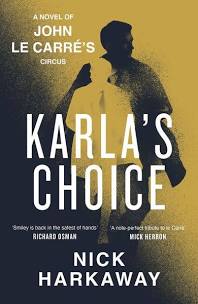
The Economist vom 24. Oktober 2024 publizierte die nachstehende Besprechung von «Karla’s Choice» und machte mich auf diese Neuerscheinung aufmerksam. Da ich früher ein auf le Carrés Werke abonnierter Leser war, musste ich natürlich zwingend dieses Buch des Sohns von le Carré (der unter dem Pseudonym ,Nick Harkaway’ publiziert) umgehend auf meine Leseliste setzen. Ich habe die Lektüre noch knapp vor Jahresende geschafft und bereue keine Minute Lesezeit. Anstelle einer ausführlichen eigenen Besprechung füge ich diejenige von The Economist an:
Characters do not die with their creators. Some live on in bold new guises in modern spin-offs and mash-ups. Over the past two decades, authors have brought Shakespeare’s protagonists and Jane Austen’s heroines into the 21st century in a range of inventive “retellings”. Another sort of resurrection can come in the form of a continuation novel. Literary estates commission authors they regard as a safe pair of (typing) hands to breathe new life into a franchise and further the adventures of much-loved characters.
Some writers have risen to the challenge more than once. Sophie Hannah has five whodunnits featuring Agatha Christie’s Hercule Poirot. Anthony Horowitz wrote two Sherlock Holmes novels, and Sebastian Faulks has produced a breezy Jeeves and Wooster caper in the vein of P.G. Wodehouse; both authors have taken James Bond on separate missions with Britain’s Secret Intelligence Service.
Another literary spy features in a new novel four years after the death of his creator: John le Carré’s valiant yet unassuming cold-war warrior, George Smiley. Set between the events chronicled in “The Spy Who Came in From the Cold” (1963) and “Tinker Tailor Soldier Spy” (1974) and incorporating familiar faces from le Carré’s fiction, “Karla’s Choice” is a continuation novel crafted with more care and attention than most. It was written by Nick Harkaway, the nom de plume of le Carré’s son.
The book begins with an unexpected visitor and a mysterious disappearance. In the spring of 1963 a Soviet assassin named Miki Bortnik turns up at the door of Laszlo Banati’s literary agency in London and announces to the assistant, fellow Hungarian émigré Susanna Gero, that he has come to kill her boss. No murder is committed: Miki reveals he has changed his mind; more important, Laszlo has gone missing. British intelligence is alerted, and George Smiley, recently retired, is lured back to “the Circus” to locate him and find out why he has “the Circus” to locate him and find out why he has fallen foul of Moscow.
From this premise, Mr Harkaway thickens his plot and spins a satisfyingly intricate tale filled with intrigue and suspense. Laszlo, more a Soviet agent than a literary one, becomes a wanted man by both sides. Smiley follows his trail to Vienna, Budapest and Berlin, a city that “existed in a frozen parody of peace”. As stakes are raised and loyalties are tested, he comes to realise that lurking in the background and calling the shots is his Russian counterpart and nemesis, Karla.
Continuation novelists must be expert impersonators. They have to adhere to tried-and tested formulas and emulate distinct narrative styles and voices. To render his book authentic, Mr Harkaway draws on all the winning elements that made his father’s novels so memorable. He creates a recognisably murky world of treachery, duplicity and moral complexity. He blends in le Carré’s tradecraft and jargon, such as lamplighters (surveillance agents) and Cousins (Americans). His cast includes the usual ragtag members of the Circus along with “the Stasi’s favourite son”, Hans- Dieter Mundt. Now and again he delights with a knowing wink to aficionados: “Spying is waiting,” he declares, recycling a leitmotif from “The Russia House” (1989).
In his author’s note, Mr Harkaway poses a question that is central to the success of a continuation novel: “Does it feel right?” The answer here is a resounding yes. “Karla’s Choice” could have been a crude pastiche and a dull drama. Instead, it is an accomplished homage and a captivating thriller. It may be a standalone story, but with luck Mr Harkaway will continue playing the imitation game.
Wie die früheren le Carrés ist das neue Werk im le Carré-Stil gehalten; d.h. es ist kein Actionthriller, in dem ständig etwas laufen, knallen oder in die Luft fliegen muss, sondern ein Buch, das seine Geschichte eher kontemplativ und mit sehr viel Reflexion der handelnden Akteure über ihr Tun und Lassen erzählt. Das macht die Lektüre manchmal sehr anspruchsvoll, aber trotzdem lohnend. Es ist allerdings schwierig, die Epoche des Kalten Kriegs der 1960-er Jahres nachzuempfinden; jüngere Leserinnen und Leser, die diese nicht selbst erlebt haben, dürften eher überfordert werden. Im Gegensatz zu The Economist wünsche ich mir nicht so sehr eine Fortsetzung des brillanten «imitation game» von Harkaway, sondern eher, dass er mit der gleichen Kreativität und sprachlichen Könnerschaft andere Themen findet, mit denen er sich als eigenständiger Autor auszeichnen kann.